Campaign Resources (403 found)
JADE: Myanmar’s “Big State Secret”
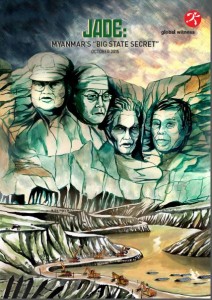 Since 2011, Myanmar’s rebranded government has told the world it is transitioning from a pariah state run by a ruthless military dictatorship to a civilian regime committed to wholesale political and economic reforms […]
Since 2011, Myanmar’s rebranded government has told the world it is transitioning from a pariah state run by a ruthless military dictatorship to a civilian regime committed to wholesale political and economic reforms […]
Myanmar: National report submitted in accordance with paragraph 5 of the annex to Human Rights Council resolution 16/21
1. During the First Cycle of UPR, the promotion and protection of human rights in Myanmar was reviewed on 27 January 2011 at the meeting of the Working Group on UPR […]
• • •Report on Repressive Laws in Burma
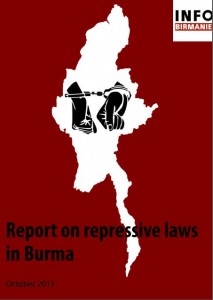 In spite of the reforms in Burma in recent years, the process of democratization has been called into question by the persistence of grave human rights violations and the absence of any significant progress on genuine democractic reforms, notably with regard to the process of legal reform […]
In spite of the reforms in Burma in recent years, the process of democratization has been called into question by the persistence of grave human rights violations and the absence of any significant progress on genuine democractic reforms, notably with regard to the process of legal reform […]
Disenfranchisement and Desperation in Myanmar’s Rakhine State: Drivers of a Regional Crisis
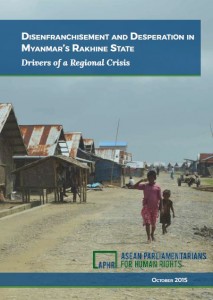 Political exclusion is exacerbating the already intense sense of desperation among Rohingya Muslims in Myanmar’s Rakhine State, and driving a regional crisis that ASEAN leaders are ill prepared to confront. Unless serious steps are taken to address the situation of deprivation and despair in Rakhine State, many Rohingya will have no other option but to flee in search of asylum elsewhere […]
Political exclusion is exacerbating the already intense sense of desperation among Rohingya Muslims in Myanmar’s Rakhine State, and driving a regional crisis that ASEAN leaders are ill prepared to confront. Unless serious steps are taken to address the situation of deprivation and despair in Rakhine State, many Rohingya will have no other option but to flee in search of asylum elsewhere […]
Burma: International Religious Freedom Report for 2014
Muslim, Christian, and other religious minorities faced physical abuse, arbitrary arrest and detention, restrictions on religious practice and travel, and discrimination in employment and access to citizenship […]
• • •Fighting between Tatmadaw and KNLA soldiers leads to violent abuse and displacement of villagers in Bu Tho Township, Hpapun District, October 2015
This News Bulletin describes three separate incidents of fighting that occurred on September 30th 2015, between Tatmadaw and Karen National Liberation Army (KNLA) soldiers in Day Wah and Kyaw Pah village tracts, Bu Tho Township, Hpapun District. This includes arbitrary arrest and detention, violent abuse of a villager, restrictions on the freedom of movement, and displacement of villagers […]
• • •Crackdown at Letpadan: Excessive Use of Force and Violations of the Rights to Freedom of Peaceful Assembly and Expression in Letpadan, Bago Region, Myanmar
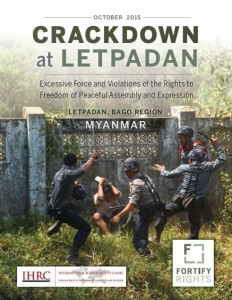 On March 10, 2015, following a weeklong standoff in the town of Letpadan in Myanmar’sBago Region, police officers violently cracked down on a group of approximately 200 protesters demonstrating against the recently passed National Education Law […]
On March 10, 2015, following a weeklong standoff in the town of Letpadan in Myanmar’sBago Region, police officers violently cracked down on a group of approximately 200 protesters demonstrating against the recently passed National Education Law […]
Elections for Ethnic Equality? A Snapshot of Ethnic Perspectives on the 2015 Elections
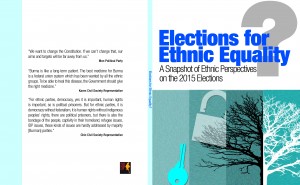 In the context of the 2015 elections, the report “Elections for Ethnic Equality? A Snapshot of Ethnic Perspectives on the 2015 Elections” aims to provide a summary of what these elections mean and how the elections are perceived in ethnic nationality areas of Burma. Given that up to 40% of the population of Burma are not ethnically Burman, it is vital to present the perspectives and attitudes, as well as the political situation, in these ethnic areas in the run up to this much anticipated event […]
In the context of the 2015 elections, the report “Elections for Ethnic Equality? A Snapshot of Ethnic Perspectives on the 2015 Elections” aims to provide a summary of what these elections mean and how the elections are perceived in ethnic nationality areas of Burma. Given that up to 40% of the population of Burma are not ethnically Burman, it is vital to present the perspectives and attitudes, as well as the political situation, in these ethnic areas in the run up to this much anticipated event […]
‘Going back to the old ways’: A new generation of prisoners of conscience in Myanmar
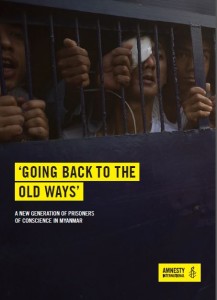 A new Amnesty International briefing – ‘Back to the old ways’ – exposes how repression has drastically picked up pace over the past two years, in stark contrast to official claims that not a single person is imprisoned for peacefully exercising their rights […]
A new Amnesty International briefing – ‘Back to the old ways’ – exposes how repression has drastically picked up pace over the past two years, in stark contrast to official claims that not a single person is imprisoned for peacefully exercising their rights […]
Forced Displacements and Destroyed Lives around Upper Paunglaung Dam in Shan State, Myanmar
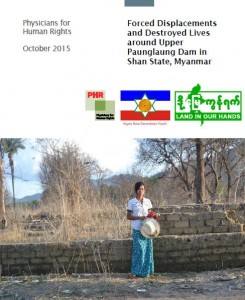 In this report, Physicians for Human Rights (PHR) builds on its previous research on land confiscations in Myanmar by using an epidemiological survey tool to assess the human rights, livelihood, and health impacts on communities displaced by the reservoir created by Paunglaung dam in southern Shan state […]
In this report, Physicians for Human Rights (PHR) builds on its previous research on land confiscations in Myanmar by using an epidemiological survey tool to assess the human rights, livelihood, and health impacts on communities displaced by the reservoir created by Paunglaung dam in southern Shan state […]

 All posts
All posts